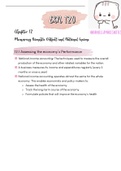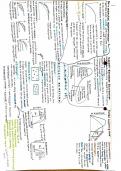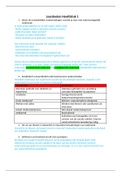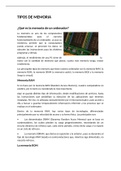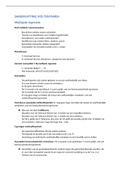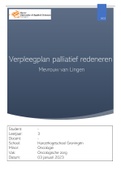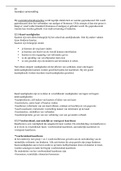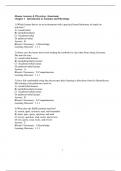Chapter 12
Measuring Domestic Output and National Income
12.1 Assessing the economy’s Performance
National income accounting: The techniques used to measure the overall
production of the economy and other related variables for the nation.
A business measures its income and expenditures regularly (every 3
months or once a year)
National income accounting operates almost the same for the whole
economy. This enables economists and policy makers to:
o Assess the health of the economy
o Track the long-term course of the economy
o Formulate policies that will improve the economy’s health
,12.2 Gross domestic product versus gross national income
The main measure of the economy’s performance is its aggregate output/
gross domestic product (GDP): the annual total output of goods and
services.
Gross domestic product (GDP): The total market value of all final goods
and services produced annually within the boundaries of South Africa,
whether by SA or foreign-supplied resources.
A related measure to GDP is:
Gross national income (GNI)= gross domestic product (GDP) + primary
income receipts – primary income payments.
GNI is ownership-based and not location based like GDP.
We use value added for all factors of production owned by the residents of a
country regardless of where the business operates.
Value added: The value of the product sold by a firm less the value of the
products (materials) purchased and used by the firm to produce the
product.
Because GNI is harder to measure, economists tend to prefer GDP.
GDP at Factor Cost, Basic and Market Prices
Three types of GDP exist:
Gross domestic product (GDP) at market prices (expenditure approach)
Gross value added at factor cost (income approach)
Plus (+): Other taxes on production
Less (-): Other subsidies on production
, Gross value added at Basic Prices
Plus (+): Taxes on products
Less (-): Subsidies on products
Taxes and Subsidies on Production
Taxes on production and imports: A national income accounting category
that includes taxes as sales, excise, business property taxes and tariffs
that firms treat as costs of producing a product and pass on (in whole or
in part) to buyers by charging a higher price.
National income: Total income earned by resource suppliers for their
contributions to gross domestic product plus taxes on production and
imports; the sum of wages and salaries, rent, interest, profit, proprietors’
income, and such taxes.
Why do national income accountants add taxes to wages, rent, interest and
profits? Accounting Convenience
Example:
1] A business sells a product for R1.
2] The production and sales of this product creates R1 of wages, rent,
interest and profits
3] But now the government imposes 15% taxes on products sold at retail
4] The retailer rises the price to R1.15
5] But now only R1 becomes wages, rent, interest and profits
6] So, accountants add R0.15 to expenditures to match the R1.15 of receipts
7] They adjust this for the entire economy
Measuring Domestic Output and National Income
12.1 Assessing the economy’s Performance
National income accounting: The techniques used to measure the overall
production of the economy and other related variables for the nation.
A business measures its income and expenditures regularly (every 3
months or once a year)
National income accounting operates almost the same for the whole
economy. This enables economists and policy makers to:
o Assess the health of the economy
o Track the long-term course of the economy
o Formulate policies that will improve the economy’s health
,12.2 Gross domestic product versus gross national income
The main measure of the economy’s performance is its aggregate output/
gross domestic product (GDP): the annual total output of goods and
services.
Gross domestic product (GDP): The total market value of all final goods
and services produced annually within the boundaries of South Africa,
whether by SA or foreign-supplied resources.
A related measure to GDP is:
Gross national income (GNI)= gross domestic product (GDP) + primary
income receipts – primary income payments.
GNI is ownership-based and not location based like GDP.
We use value added for all factors of production owned by the residents of a
country regardless of where the business operates.
Value added: The value of the product sold by a firm less the value of the
products (materials) purchased and used by the firm to produce the
product.
Because GNI is harder to measure, economists tend to prefer GDP.
GDP at Factor Cost, Basic and Market Prices
Three types of GDP exist:
Gross domestic product (GDP) at market prices (expenditure approach)
Gross value added at factor cost (income approach)
Plus (+): Other taxes on production
Less (-): Other subsidies on production
, Gross value added at Basic Prices
Plus (+): Taxes on products
Less (-): Subsidies on products
Taxes and Subsidies on Production
Taxes on production and imports: A national income accounting category
that includes taxes as sales, excise, business property taxes and tariffs
that firms treat as costs of producing a product and pass on (in whole or
in part) to buyers by charging a higher price.
National income: Total income earned by resource suppliers for their
contributions to gross domestic product plus taxes on production and
imports; the sum of wages and salaries, rent, interest, profit, proprietors’
income, and such taxes.
Why do national income accountants add taxes to wages, rent, interest and
profits? Accounting Convenience
Example:
1] A business sells a product for R1.
2] The production and sales of this product creates R1 of wages, rent,
interest and profits
3] But now the government imposes 15% taxes on products sold at retail
4] The retailer rises the price to R1.15
5] But now only R1 becomes wages, rent, interest and profits
6] So, accountants add R0.15 to expenditures to match the R1.15 of receipts
7] They adjust this for the entire economy

